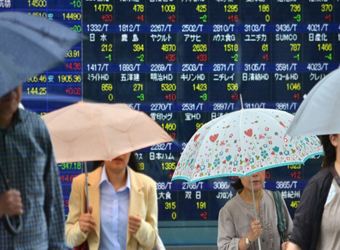Asian markets were mixed in Wednesday trade, as Australian and Japanese energy names rose after oil touched a more than two year high overnight. Meanwhile, South Korea’s Kospi index was dragged lower by shipbuilder Hyundai Heavy Industries even as blue-chip tech names rebounded.
Japan’s benchmark Nikkei 225 hovered around breakeven after coming under slight pressure in the previous session. The index nudged higher by 0.06 percent as trading houses saw gains while major exporters traded mixed, with Toyota higher by 0.17 percent.
Meanwhile, most energy-related names recorded solid gains after oil prices touched their highest levels in more than two years on Tuesday. Inpex rose 3.18 percent and Japan Petroleum Exploration advanced 4.03 percent.
Across the Korean Strait, the Kospi declined 0.21 percent. Blue-chip tech stocks, which had sold off in the last session, were a bright spot, although those gains were offset by losses in manufacturing names and financials. Samsung Electronics rose 1.08 percent while Posco declined 1.47 percent.
South Korea’s Hyundai Heavy Industries plunged 28.75 percent after it announced Tuesday that it intended to list Hyundai Oilbank in 2018, Reuters reported. The move will likely raise some $1.2 billion through a share issue, Reuters said. Shares of holding company Hyundai Robotics fell 4.01 percent.
The S&P/ASX All Ordinaries Gold sub-index rose 2.29 percent. Energy-related names also advanced, with Santos climbing 1.79 percent.
Greater China markets were narrowly mixed. The Hang Seng Index edged up 0.03 percent. On the mainland, the Shanghai Composite shed 0.13 percent and the Shenzhen Composite was off 0.05 percent.
Meanwhile, profits made by Chinese industrial companies rose 14.9 percent compared to one year ago, Reuters said, reflecting the poorest growth figure since April this year. Industrial profits had risen 25.1 percent in October.
Apple suppliers in Asia were also in the
spotlight after Apple fell 2.5 percent during the U.S. session following a report from Taiwan’s Economic Daily that the company will slash its iPhone X sales forecast. An Apple spokeswoman told Reuters that it did not comment on “market rumors.”
Hong Kong lens manufacturer Sunny Optical lost 5.98 percent, and AAC Technologies tumbled 5.89 percent. Apple suppliers in Taiwan fared better, having already recorded losses earlier this week on that news. Pegatron was up 1 percent and Hon Hai Precision Industry was higher by 0.99 percent.
U.S. stocks finished the Tuesday session lower following the long Christmas weekend. Retailers stateside notched gains, although losses were seen in the tech space. The Dow Jones industrial average closed off 0.03 percent, or 7.85 points, at 24,746.21.
Major European markets remained closed on Tuesday.
Oil prices were in focus
during the session after soaring to a more than two-year high overnight. That followed news that a crude pipeline in Libya that carried up to 100,000 barrels per day had been attacked on Tuesday, according to Reuters.
U.S. crude futures pared gains on Wednesday, shedding 0.4 percent to trade at $59.73 per barrel after cracking the $60 mark in the previous session. Brent crude shed 0.45 percent to trade at $66.72 after climbing more than 2 percent overnight.
Still on the commodities front, gold prices held onto overnight gains after rising to a more than three-week high in the previous session amid a softer dollar. The yellow metal last traded at $1,282.02 an ounce.
Currency markets were relatively quiet in comparison to moves seen in commodity markets. The dollar index, which tracks the U.S. currencies against six major peers, was largely flat at 93.267 at 12:39 p.m. HK/SIN.
The greenback was a touch firmer against the Japanese yen, last fetching 113.23, compared to the 113.19 seen on Tuesday. The release of inflation data out of Japan on Tuesday had shown that core consumer prices in Japan increased for 11 consecutive months.
Bitcoin continued to reboundafter tumbling late last week. The cryptocurrency extended gains to trade at $16,368.24 at 12:40 p.m. HK/SIN after touching as high as $16,380.37 earlier, according to industry site CoinDesk.
Japan’s Mitsubishi UFJ Financial Group said in a statement released Tuesday that it would be taking a 73.8 percent stake in Indonesia’s Bank Danamon.
The deal will take place in three stages and supports MUFG’s push to expand its presence in the region. MUFG shares traded 0.28 percent lower, underperforming other Japanese banks on the day.
Meanwhile, shares of Danamon rose 15 percent after earlier touching a 17-year peak.


